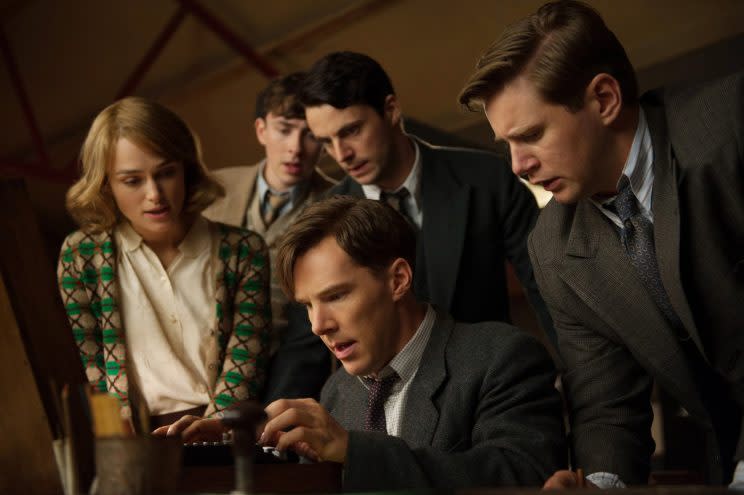‘The Imitation Game’ and ‘American Sniper’ Among Least Accurate ‘True Story’ Movies, Researcher Finds

The phrase “based on a true story” can mean anything from “slavishly accurate” to “vaguely based on a real thing that might have happened” — and most movies using the tagline fall somewhere in the middle. Without extensive research, there’s no way of knowing the exact percentage of fact vs. fiction in any given film. But it just so happens that journalist and designer David McCandless has done that very research. On his website Information Is Beautiful (via Collider), McCandless does a scene-by-scene breakdown of 14 recent, notable “true story” films, citing where they stick to the truth and where they deviate. Color-coded graphs show at a glance which films got it mostly right (Spotlight, Selma, The Big Short) and which played fast and loose with the facts (The Imitation Game, Dallas Buyers Club, American Sniper).
Related: Fact vs. Fiction: 5 Oscar Movies Criticized for Taking Creative License
Obviously, “truth” can be subjective, and these aren’t documentaries. That said, McCandless’ extensive research yields some surprising results. The movie that he finds to be the most accurate is Selma, Ava DuVernay‘s 2014 drama about Martin Luther King’s fight for voting rights (starring David Oyelowo). Although DuVernay was unable to use King’s actual speeches, the events shown in the movie are almost entirely verifiable. The gray area (or pink, in the case of the website’s graphs) comes most often in the scenes with President Lyndon Johnson, which were the subject of some controversy around Oscar time, with critics claiming the film unfairly portrayed him as ambivalent about the Civil Rights Act (which Johnson signed into law in 1964).

So, which of the films did McCandless find to be least accurate? That would be 2015’s The Imitation Game, based on the life of mathematician and computer pioneer Alan Turing (played by Benedict Cumberbatch). Per the site’s research, the historical drama did get a few basic things right about Turing’s life during World War II, but takes dramatic liberties in depicting his work, personality, and relationships. An entire key plot point — Turing being under suspicion as a possible spy — was apparently invented out of thin air.
A close runner-up for the least accurate “true story” is American Sniper, Clint Eastwood‘s blockbuster based on the life of Navy S.E.A.L. Chris Kyle. While the lead character played by Bradley Cooper struggles with guilt and alienation from his time in the service, Kyle’s own autobiography (the source for both the film and the website’s fact-checking) reportedly doesn’t express much of these feelings. And while Eastwood depicts a number of true events from the Iraq War, Kyle’s role in them is often exaggerated, according to the site’s fact check.
Related: The Inside Story on Bradley Cooper’s Grueling ‘American Sniper’ Prep
Most of the films studied by McCandless are, by his calculation, between 60% and 90% true, including The King’s Speech, The Wolf of Wall Street, 12 Years a Slave, and Captain Phillips. For the full breakdown of “based on a true story” films, visit Information is Beautiful.
The real people of ‘Selma’: Watch a featurette:


